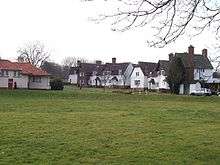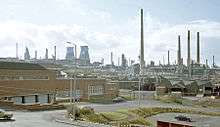Llandarcy

Llandarcy is a village near Neath in Neath Port Talbot county borough, southwest Wales, and formerly the site of the UK's first oil refinery. The village, which lies near the Junction 43 of the M4 Motorway, was originally designed as a garden village to house the workers for the refinery, built by BP Oil between 1918-22.[1]
History

Llandarcy was chosen as a site for a refinery because Neath Rural district Council was the only council in the country at that time which could guarantee the requisite daily volume of water required by the refinery. This was supplied from the recently constructed reservoir at Ystradfellte, which was proposed and promoted by Councillor Howells of Skewen. Llandarcy's proximity to Swansea docks, where crude oil could be transported by sea from the Middle East was incidental. Llandarcy was the source of the fuel pipeline PLUTO (Pipe Line Under The Ocean) which supplied fuel to the D day landings.The site was damaged by Luftwaffe bombing in 1940.[2] At its peak the refinery was a major employer in South West Wales, with over 2600 workers.[3] However, it was also responsible for industrial pollution at nearby Crymlyn Bog, an area designated as a Site of Special Scientific Interest.[4] Operations at the refinery were gradually scaled back in the late 20th century, and the site closed in 1998.[5]
The village, named after William Knox D'Arcy (founding director of the Anglo-Persian Oil Company, forerunner of BP) consisting of exactly 100 houses and flats each property was designed to be different, they are all of stone construction with a community centre and local shop. The village is a conservation area as its construction followed the lines of the Cadbury village. The village was the site of the murders of school girls, Geraldine Hughes and Pauline Floyd in 1973. Their killer's identity remained a mystery until 29 years later in 2002 when DNA evidence was taken by South Wales Police from the grave of Joe Kappen, who worked as a doorman, lorry and bus driver. Kappen died of lung cancer on 17 June 1990, at the age of 49, and took his secret with him to the grave.[6]
Sport and leisure
BP, the company operating the refinery, also operated a sports and leisure club. Following the closure of the refinery, the leisure facilities were acquired by Llandarcy Park Ltd, which redeveloped the site with a new health and fitness club, hotel and restaurant.[7] Llandarcy now hosts the Virgin Active Health & Racquets Club (formerly known as the Glamorgan Health & Racquets Club), which has a range of indoor and outdoor sports facilities,[8] and the Llandarcy Academy of Sport, which has one of only two indoor grass training fields in Wales.[9]
Plans
The disused land from the scaling down of the oil refinery has found a number of new uses. Part of the site is now occupied by offices of the Environment Agency Wales. Land near the entrance of the old refinery near M4 Junction 43 has been redeveloped as a business park.[10] All of the remaining brownfield land which was occupied by the refinery is being re-developed into a new village called Coed Darcy. The Prince's Trust is an interested party in this development, which seeks to develop the site as an "Urban Village" in the same vein as the Poundbury village project.[11]
References
- ↑ St. Modwen Properties PLC Investor Site Visit - 1 October 2007. Brownfield renewal in the South West and Wales region
- ↑ Assessment and Restoration of the BP Llandarcy Refinery Landfill 25 May 2004
- ↑ Land Restoration / Llandarcy, Wales
- ↑ BTC General Oil Spill Response Plan: Appendix F, Potential Impacts of Oil Spillage to an Onshore Environment
- ↑ Progressive | The helios awards | BP
- ↑ The hunt for the Saturday Night Strangler | Life and Style | The Guardian, Saturday 18 January 2003
- ↑ Neath Port Talbot County Borough Council - Press Release - Llandarcy Park Ltd 19.02.2001
- ↑ The Virgin Active Health & Racquets Club
- ↑ Llandarcy Academy of Sport
- ↑ Neath Port Talbot County Borough Council - Development of Sites and Premises
- ↑ "Llandarcy Urban Village Project". The Civic Trust for Wales. Retrieved 2007-12-23.
External links
-
 Media related to Llandarcy at Wikimedia Commons
Media related to Llandarcy at Wikimedia Commons - Llandarcy Academy of Sport
- Coed Darcy Urban Village
- Land Restoration / Llandarcy, Wales
- www.geograph.co.uk : photos of Llandarcy and surrounding area
Coordinates: 51°38′25.00″N 3°50′53.00″W / 51.6402778°N 3.8480556°W